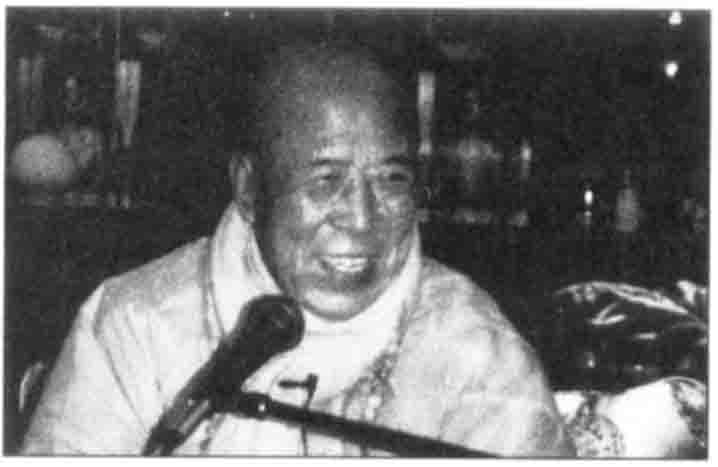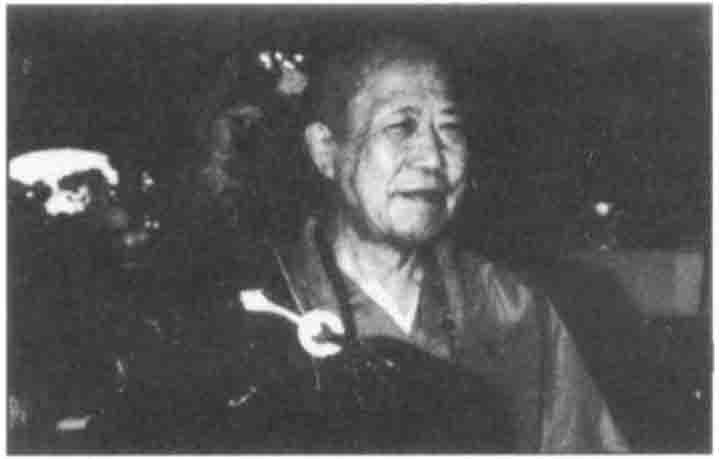前期提示:第三大願。願我來世得菩提時。以無量無邊智慧方便。令諸有情。皆得無盡。所受用物。莫令眾生。有所乏少。

「令諸有情」:令所有的有情「皆得無盡」。皆得,都得到。得到什麼呢?「所受用物」。就是他們所需要的東西,他們都得到;需要什麼就得到什麼。你看佛這種布施心多大!他用他這個願力來滿眾生的願,滿眾生的所求,所以「莫令眾生,有所乏少」:他這個願力是不要令眾生有貧乏,有缺少,什麼都滿足,遂心滿願,如意吉祥。你們要是想滿足你們自己這個貪心的話,就趕快學念藥師琉璃光如來名號,或者念《藥師琉璃光如來本願功德經》,都能滿足你們那個貪心。
說:「那我知道了,我現在趕快念這個藥師琉璃光如來名號,等我到 Reno(賭城雷諾)那兒去,我賭一下子就贏了幾百萬,回來我再也就不賭了,這是我的所求,我所需要的。」你要是真心,或者也可以滿足你的願。但是你若將信將疑的,藥師琉璃光如來也不會被你欺騙的,你用一個不真實心去想騙他,是騙不了的。
第四大願。願我來世得菩提時。若諸有情。行邪道者。悉令安住菩提道中。若行聲聞獨覺乘者。皆以大乘而安立之。
「第四大願」:藥師琉璃光如來在因地修道發十二大願,這第四願,他是願所有的眾生都捨邪歸正,反迷歸覺,離苦得樂;那麼願意修小乘的人,都迴小向大,發真正的菩提心,將來成就佛果,所以他才說第四個願。說是「願我來世」:他說現在我是沒有成佛,那麼將來等我成佛的時候,得到正等正覺這菩提果位的時候,「若諸有情」:有情就是所有一切眾生。所有眾生正知正見的人很少,那麼邪知邪見的人多。你若講說正法,很少人明白,能接受,去實行。可是你若說一些個旁門左道的法,或者什麼祕密法,或者走捷徑的法,這個人就都發狂了,想要去學這種的法。這為什麼呢?就因為人這個邪知邪見太深,正知正見可以說是少,所以就說這一切的有情,「行邪道者」:他修一些個外道法,不求正法,也就是所謂學那個落降頭,或者學那個給人下蠱,或者玩那個碟仙,或者又是扶鸞,這樣人就相信了。你若正式給他們講經說法呢?他們聽著也覺得沒有什麼大意思。你若弄出一點邪門來,邪裏邪氣的,或者恣言禍福,說:「你又有什麼災難了,有什麼危險了,你現在要如何如何,才能免去你的災難!」這個人就相信了。你若給他講正式的佛法,他就不願意聽,所以這就叫行邪道者。
「悉令安住菩提道中」:雖然他們是行邪道的,可是藥師琉璃光如來他儘量設方便法門,令這個人反迷歸覺,捨邪歸正,了生脫死,發大菩提心,安住在這個菩提道裏邊。安住就是捨邪歸正了,再不去想旁門左道了,安住在這個覺道裏邊。覺道是什麼呢?覺道就是人的智慧。你能有智慧,就會行正法;你沒有智慧--愚癡,就要行小道--旁門外道了。所以現在由旁門外道,返回來到真正的佛教裏邊,這叫安住菩提道場。
「若行聲聞獨覺乘者」:若修行聲聞,聲聞就是修四諦法--苦、集、滅、道這四諦的。獨覺呢?就是修十二因緣。十二因緣就是無明緣行、行緣識、識緣名色、名色緣六入、六入緣觸、觸緣受、受緣愛、愛緣取、取緣有、有緣生、生緣老死。所有的眾生都是由這個十二因緣而生,所以也由這個十二因緣而滅;這也就是「諸行無常,是生滅法;生滅滅已,寂滅為樂。」若能了悟這個十二因緣就反迷歸覺了,迴小向大了;迴小向大就是修六度法門。
十二因緣,我們人怎麼樣生的呢?就是從無明生的,就是糊糊塗塗就生出來了,這叫一個無明。這個無明就是煩惱的一個根本,也是生死的一個根本,也是所有麻煩的一個根本,也是所有問題的一個根本。修是修什麼呢?就要破無明,這個無明就是你做出的事情還不明白,糊裏糊塗就做了;做了也不了解,不了解還要做,這就是無明。這一切一切你不明白的問題,都是無明,都是這個無明在那兒支配著你,令你這麼顛顛倒倒,迷迷糊糊,醉生夢死,貪著財、色、名、食、睡,都是這個無明在那兒搗亂。
因為有無明,然後就發之於行為,就有了行為了,就要去做去。做什麼呢?做你所不明白的事情。你明白只是一點點,而不是完全明白,所以就要去做了。有了行為,然後這就有了痕跡,有了事實,落到事相了!因為你有行,所以有事相了。有了相,然後就有了名了。
行的時候,那個分別心還沒有生出來;你看你行完了之後,就有了識了,就有分別心了,有了知識了。有了分別,人相、我相、眾生相、壽者相,就都出來了。那麼這個識,是個意識,意識就是那個地方有了作用了;有作用,然後就有了名色,可以說出這是個什麼;有了名色了,然後就有了全體了;有了全體,就有六入了。這六入,無論什麼事情都有一個體相,他那個體相就生出來了。
體相一生出來了,和外邊的物質就有接觸,所以就有了觸了。有觸,然後就有領受了;有領受,就分別好的觸和不好的觸,歡喜的和不歡喜的。於是乎這不歡喜的就不要了,歡喜的就生出一種愛心了。所以說觸緣受,受緣愛;受就生出愛心來了,這都是有一連串的關係。
有了愛心,就想把它取為己有,做為我自己的了。有了有,就又有了來生;有了來生,就又有了老死。這十二因緣,是一切眾生怎麼樣做的眾生?怎麼樣又沒有的?就是這個,所有的人類和一切眾生都包括在這個理論裏頭。
這個獨覺的人,他看十二因緣這種循環無端、沒有停止的時候,他覺得很痛苦的,所以就修道。修道嘛,就要了生死、脫輪迴,把這輪迴脫去了,生死的輪也息了,所以就證果,叫獨覺,這是二乘人。聲聞、緣覺--緣覺又叫獨覺--這叫二乘。
所以行這個聲聞和獨覺乘者,「乘」就是這一類的修行人,怎麼樣呢?這是不究竟法,到這個二乘,分段生死是了了,變易生死還沒有了。所以藥師琉璃光如來在因地的時候就發願:「皆以大乘而安立之」。說,「若有修小乘的,我就教他們從小乘而搬家,搬到大乘的道路上;迴小向大,發真正的無上正等正覺成佛的心。」
待續
|
|
Sutra text from last issue: The third great vow:‘I vow that in a future life when I attain Bodhi,I will,by means of limitless,unbounded wisdom and skill-in-means,enable all sentient beings to obtain an inexhaustible supply of material necessities so they are without the slightest want.’
He does this to enable all sentient beings to obtain an inexhaustible supply of material necessities so they are without the slightest want. See how generous the Buddha’s heart is! He provides living beings with everything they need and fulfills all their wishes. If you are greedy, learn to recite this Buddha's name or this Sutra, quick! Then you'll be able to satisfy your greed!
“I know,” you say, “I'll recite Medicine Master Buddha's name with the wish of winning a few million dollars at the casinos in Reno.” If you are sincere, your wish might come true. But if you waver between faith and doubt, you can't fool the Buddha.
Sutra:
The fourth great vow: ‘I vow that in a future life when I attain Bodhi, I shall lead those sentient beings who practice deviant paths to reside in the Bodhi Way, and those who travel on the vehicles of the Hearer or Pratyekabuddha to abide in the Great Vehicle.’
Commentary:
In the fourth great vow, Medicine Master Buddha wants to cause deviant beings to become proper, confused beings to become enlightened, and those in suffering to find bliss. He also wishes that adherents of the Small Vehicle will study and practice the Great Vehicle, resolve their minds on Bodhi, and realize Buddhahood. So he said, “I vow that in a future life when I attain Bodhi, when I become a Buddha and attain Proper and Equal, Right Enlightenment, I shall lead those sentient beings who practice deviant paths to reside in the Bodhi Way.” Very few people possess proper understanding, while many have deviant understanding. If you expound the Proper Dharma, very few people can understand, accept, and put it into practice. On the other hand, if you teach heterodox theories, esoteric dharmas, or “shortcut” dharmas, people, with their deeply ingrained deviant views, are immediately eager to learn. “Deviant paths” refers to casting hexes, poisoning people, consulting oracles, or communicating with spirits through mediums. Such dharmas are very popular. If you lecture on the Sutras in the proper manner, people find it boring and meaningless. But if you make deviant prophecies, such as, “A disaster is about to befall you. If you want to save yourself, you'd better do as I tell you!” then people listen.
Although they practice deviant paths, Medicine Master Buddha sets up expedient methods to help them wake up from confusion and establish proper views, so that they can “reside in the Bodhi Way.” To reside there means to renounce deviant teachings, develop wisdom, end birth and death, and dwell in enlightenment. Wise people practice the Proper Dharma while stupid people walk a narrow, external path. To reside in the Bodhi Way means to leave the external sects and go over to genuine Buddhism.
And those who travel on the vehicles of the Hearer or Pratyekabuddha. Hearers cultivate the Dharma of the Four Noble Truths, which are suffering, accumulation, cessation, and the Way. Pratyekabuddhas (also known as Those Enlightened to Conditions) cultivate the Twelve Conditioned Causes, which are as follows:
1. ignorance, which (is the condition that) brings on
2. activity, which brings on
3. consciousness, which brings
4. name and form, which bring on
5. the six entrances, which bring on
6. contact, which brings on
7. feeling, which brings on
8. craving, which brings on
9. grasping, which brings on
10. becoming, which brings on
11. birth, which brings on
12. old age and death
The Twelve Conditioned Causes describe the process by which all living beings come into and pass out of existence. As it is said, “All activities are impermanent, subject to production and extinction. When production and extinction are extinguished, that still extinction is bliss.” If one understands the Twelve Conditioned Causes, then one can wake up from confusion and cultivate the Six Perfections of the Great Vehicle.

The Twelve Conditioned Causes—We were born from ignorance. Ignorance is the root of birth and death, the source of all troubles and afflictions. The goal of our practice is to break through ignorance. Ignorance confuses us, so that we live as if drunk or dreaming, driven by the desires for wealth, sex, fame, food, and sleep. Ignorance causes us a lot of trouble. Once there is ignorance, it manifests in activity. We act on what we don't understand, and then we become attached to appearances. When consciousness arises and begins to discriminate, the marks of self, others, living beings, and a life span appear. Activity and consciousness bring name and form into being, so that we can talk about things. Then the whole body comes into being, and with it, the six entrances [eyes, ears, nose, tongue, body, and mind]. The six entrances come into contact with the external environment, and that contact brings on feeling. We differentiate between good and bad sensations, trying to avoid unpleasant sensations while craving pleasant ones. Thus, feeling then brings on craving. As we grasp at the object of our craving, there is becoming, then birth into the next life, and then old age and death all over again. The Twelve Conditioned Causes describe the endless rounds of rebirth that all living beings undergo.
Pratyekabuddhas feel that this cycle is a lot of suffering, so they practice the Way in order to liberate themselves from birth and death. When they succeed, they certify to the fruition and become Pratyekabuddhas or Solitarily Enlightened Ones, who belong to one of the Two Vehicles.
The Two Vehicles consist of the Hearers and Those Enlightened to Conditions (also called Solitarily Enlightened Ones). The term “vehicle” is used to designate a class of cultivators. The practice of the Two Vehicles is not ultimate, because they have ended only physical birth and death, not the birth and death of thoughts. This is why Medicine Master Buddha vowed to lead the cultivators of the Small Vehicle to abide in the Great Vehicle and to resolve their minds on realizing the Buddhas’ Unsurpassed Enlightenment.
To be continued |